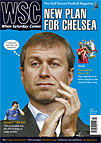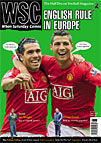What are the expectations for the team?
Quarter-finals and then home. The usual.
Are there any players who have appeared in TV commercials or other advertising?
Square-jawed goalie Iker Casillas, whose preppy, school-prefect appearance never fails to attract the advertising companies, inevitably appears in some hands-related TV spots when a major competition looms. He has just insured his hands for €7.5m and the insurers, Groupama, have been quick to get out an ad in which he puts on the light with his nose, opens the door with his head, etcetera.
Which players are good interviewees and who are the worst?
Cesc Fábregas is marginally more tedious to listen to in English than in Spanish, which might have something to do with the fact that neither is his native language; Xabi Alonso comes over in all three of his languages as someone determined to avoid the prepackaged response; and Valencia’s David Villa is a straight talker, unusually frank and unafraid of upsetting the sponsors. Barça’s Carles Puyol has improved his diction over the years, but is still incapable of finishing a sentence without the word “no”.
Is the coach popular?
That depends on whether you are pro-Madrid or anti-Madrid. Those in favour of Raúl being excluded from the national side tend to be Catalans, Basques and any other awkward region who fail to buy in to the Iberian idea – and they have no problem with Luis Aragonés, despite his obvious madness. Those in favour of Raúl’s inclusion think that Aragonés is not only mad but the devil incarnate. And when all the noise dies down, Spain have managed to attain fourth place in the FIFA rankings and 16 games undefeated without Raúl, which probably says something for Aragonés’s decision.
Are there any players with unusual hobbies or business interests?
Real Madrid’s Sergio Ramos is rumoured to be signing a deal with fashion house Dolce & Gabbana. Puyol still effects a pre-match psyche‑up routine using a potent mix of the Ramones and Napalm Death, whereas Liverpool’s Pepe Reina likes jewellery, Bang & Olufsen systems and grey Porsche Cayennes, all of which were nicked from his house while he was saving penalties against Chelsea in last year’s Champions League semi-final.
Will there be any rehearsed goal celebrations?
The squad is currently practising the complex mime sequence required by Swing Low Sweet Chariot. This is in acknowledgement of the Sky Sports campaign to encourage English subscribers to support Spain for the duration. The sport tabloid Marca, bemused by Sky’s initiative, remarked: “Why don’t the English support Croatia? It was they, after all, who did England the favour of showing them how crap they are.”
What will TV coverage be like?
Cable channels La Cuatro and Digital Plus have won the rights battle, which means that the non-subscribing public will be spared the idiosyncrasies of La Sexta’s Julio Salinas (ex-Barça) and the incomprehensible Kike, once of Atlético Madrid. Instead, so the rumour goes, Raúl has been signed up by La Cuatro – which should guarantee that everyone signs up to Digital Plus, featuring the indomitable Michael Robinson, who remains a cult figure in Spain.
Will there be many fans travelling to the tournament?
There was a national competition recently to supply lyrics for Spain’s wordless national anthem, the winner of which starts: “Long Live Spain! Let us all sing together with different voices.” You can’t quite see that one attracting the Catalan camp (whose minister of culture, incidentally, dismissed the song as “drivel”) or the travelling diehards, who are instead working on a version of Spain’s satirical entry for Eurovision 2008 in May, Baila el Chiki Chiki – a catchy ditty which stands much more chance of winning a trophy than does the national squad. According to his website, the legendary drummer Manolo will be going, of course, although last time he travelled to Germany his bar/museum in Valencia was ransacked.
Phil Ball
 Zenit St Petersburg may be suddenly popular in one half of Glasgow, but the manner of their success means they have been losing fans in Russia. Saul Pope explains
Zenit St Petersburg may be suddenly popular in one half of Glasgow, but the manner of their success means they have been losing fans in Russia. Saul Pope explains